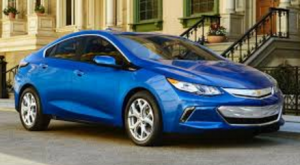by Jon LeSage, editor and publisher, Green Auto Market
Here’s my take on the 8 most significant and interesting occurrences during the past week…….
 Latest on 2016 Chevy Volt: For the redesigned Volt, here are a few interesting facts……. It’s only available now in California and a few other plug-in friendly states with nationwide rollout coming up in early 2016…….. The 2016 model year will be short with the 2017 model rolling out in the spring. That seems to come from needing to get the redesigned Volt out on time with the scheduled 2016 launch, but not having extra features ready at the time. Those will be available starting with 2017 at the same price as 2016; one of these options will be adaptive cruise control as an option on the Premier model with next-gen features like blind-spot warning and forward-collision warning…….. There will also be a new exterior color option for 2017, called Citron Green Metallic.
Latest on 2016 Chevy Volt: For the redesigned Volt, here are a few interesting facts……. It’s only available now in California and a few other plug-in friendly states with nationwide rollout coming up in early 2016…….. The 2016 model year will be short with the 2017 model rolling out in the spring. That seems to come from needing to get the redesigned Volt out on time with the scheduled 2016 launch, but not having extra features ready at the time. Those will be available starting with 2017 at the same price as 2016; one of these options will be adaptive cruise control as an option on the Premier model with next-gen features like blind-spot warning and forward-collision warning…….. There will also be a new exterior color option for 2017, called Citron Green Metallic.- New Eco option for 2016 Prius: Toyota is adding another version of the Prius for the 2016 model – the standard hatchback version which now has 52 combined city/highway mileage; and the 2016 Prius Eco is rated at 56 mpg combined (58 mpg city, 53 mpg highway) – which would make it the highest mileage non-plug-in model out there. The 2016 Toyota Prius Eco comes with a lithium-ion battery pack that’s smaller and lighter than the nickel-metal-hydride pack in the entry-level Prius Two model.
- Ford and Google: Ford CEO Mark Fields will likely announce an alliance between Ford and Google during his keynote speech next month at the annual Consumer Electronics Show in Las Vegas. The two companies are expected to forge an alliance for joint development of autonomous vehicles. That could help jump-start testing an autonomous version of the Ford Fusion Hybrid sedan on public roads near its high-tech center in Silicon Valley in the near future.
- FAST Act and EVs: The Fixing America’s Surface Transportation Act (FAST Act) passed through Congress and was signed by the president at the beginning of December. While natural gas vehicle advocates saw the benefits gained, electric vehicle fans have a few things to look forward to, as well. The U.S. Dept. of Transportation will designate corridors for electric vehicle charging; hydrogen, natural gas, and propane autogas fueling sites will also be part of the designated corridors. DOT will need to designate these corridors in the next year – by December 2016, and updates and re-designations will be released every five years. DOT will name these highway corridors based on perceived demand for the infrastructure, strategic importance of a stretch of highway, and pre-existing charging and fueling infrastructure.
- NGV forecast report: Declining oil prices, along with gasoline and diesel pump prices, have softened global demand for natural gas vehicles. Several regions already have substantial markets for NGVs that are expected to continue growing over the next decade, but at a slower pace, according to a Navigant Research study. Global annual NGV for CNG and LNG vehicle sales are expected to grow from 2.4 million vehicles in 2015 to 3.9 million in 2025.
- New DOE reports: The U.S. Department of Energy has released two alternative fuel reports. “State of the States: Fuel Cells in Americas 2015” offers a comprehensive analysis of state activities supporting fuel cell and hydrogen technology, profiles of leading states, and a catalog of recent installations, policies, funding, and deployments around the country. “Biogas Opportunities Roadmap Progress Report” comes from the Whitehouse Climate Action Plan’s directive to reduce methane emissions. The report tracks how strategically deployed biogas systems offer the nation a cost-effective and profitable solution to reducing emissions, diverting waste streams, and producing renewable energy.
- Lyft gets LAX access: Ride-hailing service Lyft can now pick up riders at Los Angeles International Airport – an approval process taking much longer than had been originally expected. Uber was not included in the decision, and that company is hopeful that it’s “only a matter of time” before Uber is available at LAX for pickups. Both companies have been allowed to drop off passengers at LAX for the past two years. Lyft and Uber have been heavily battled by taxi operators, who are losing business to these companies. LAX lacks direct rail service, faces heavy traffic gridlock, and pricey parking rates, which backers say may Lyft and Uber more appealing.
- EV forecast: Navigant Research expects that the global light duty electric vehicle market will grow from 2.6 million vehicle in sales in 2015 to over six million in 2024. Strong government support through vehicle fuel efficiency regulations, as well as purchase incentives in North America, Europe and Asia Pacific have supported these sales. Automakers are helping increase market acceptance through increasing battery electric vehicle range and reducing vehicle cost and charging time. Electric utilities in global markets are determining how best they can take part in encouraging electric vehicle market growth and charging, which is also supporting adoption of EVs.



